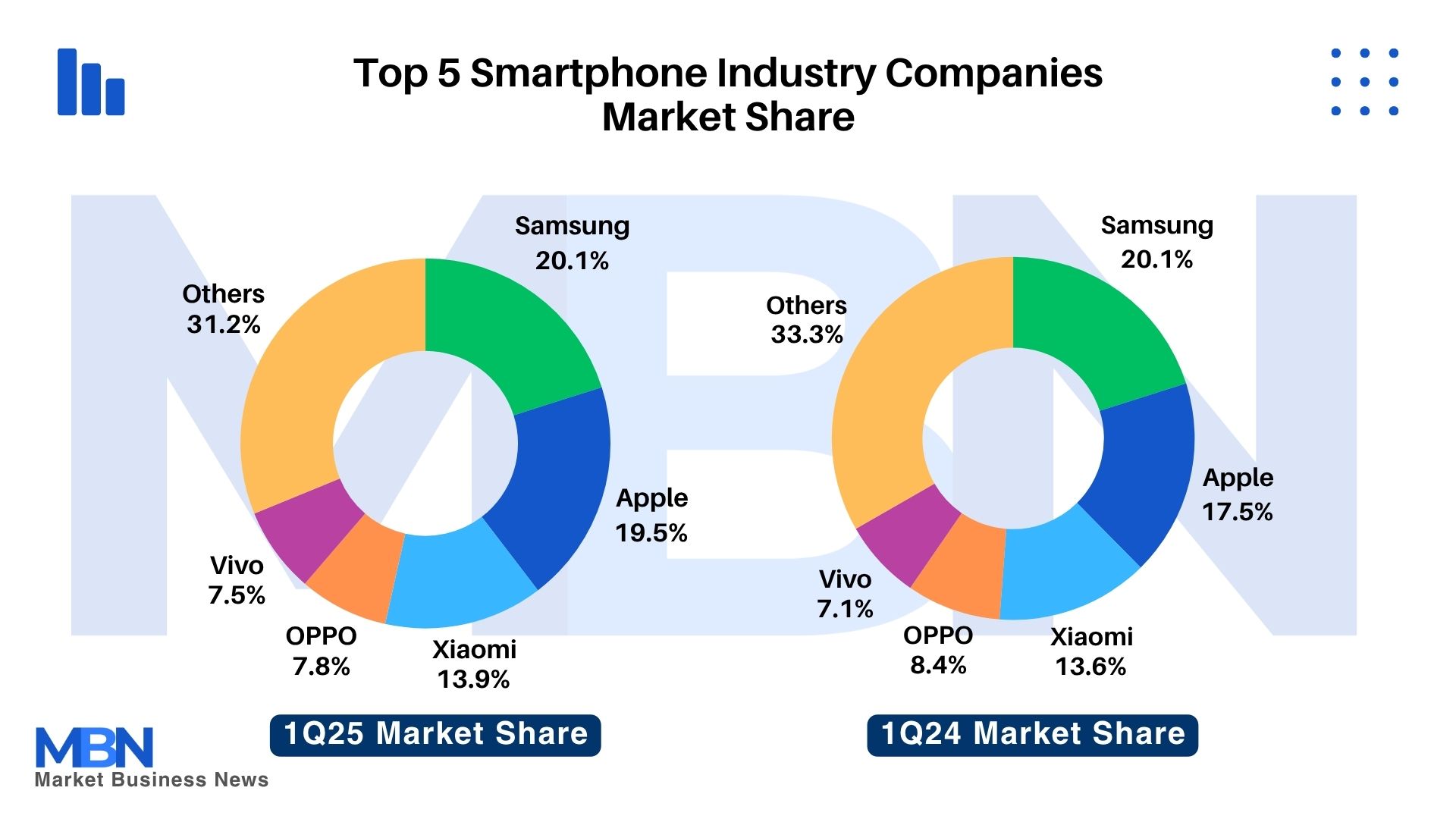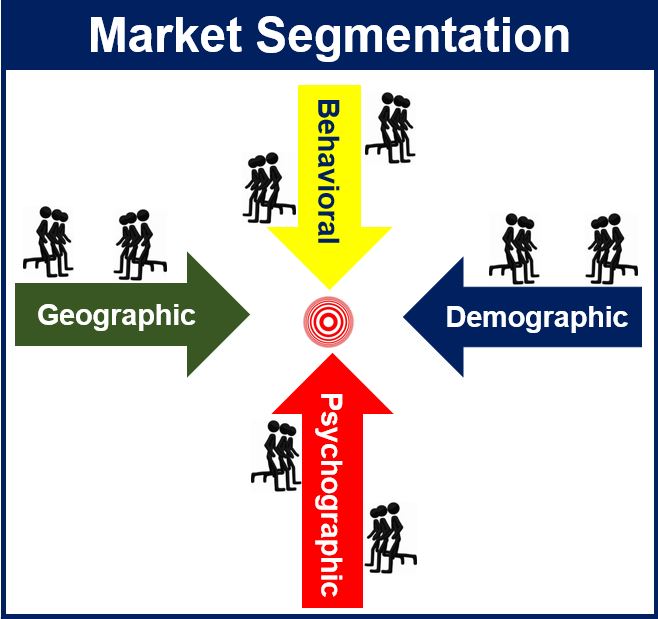Understanding how businesses compete and succeed requires knowing four fundamental market strategy concepts: Market Share, Market Segmentation, Market Penetration, and Market Positioning. Understanding this framework helps you see business as a chess game rather than random moves. You can predict competitors’ next moves, understand why certain strategies succeed or fail, and make better decisions in your own professional and personal life.

In today’s economy, where every company from your local coffee shop to global tech giants uses these market strategies, this knowledge transforms from academic concepts to practical life skills. Whether you’re negotiating a raise (understanding your positioning in the job market), starting a side business (identifying your target segment), or just trying to get the best value as a consumer (recognizing penetration pricing), these concepts provide a lens for clearer decision-making.
This guide explains each concept in detail and provides real company case studies, making the ideas easy to grasp and providing insights you can act on.

- Market Share tells you how big your slice of the pie really is.
- Market Segmentation sorts the arena into the exact crowds you want cheering for you.
- Market Penetration pushes your existing product deeper into those crowds’ daily lives.
- Market Positioning decides the story people repeat about you long after the commercial ends.
Table of contents
- Market Share: Who Has the Biggest Slice of the Pie?
- Market Segmentation: Finding Your Perfect Customers
- Market Penetration: Growing Your Slice of the Existing Pie
- Market Positioning: Winning the Battle for Consumers’ Minds
- Bringing It All Together: How These Market Strategy Concepts Connect
- Key Takeaways for Business Success
Market Share: Who Has the Biggest Slice of the Pie?
What is Market Share?
Think of any industry as a large pizza. Each company gets a slice proportional to their sales – that’s their market share. If McDonald’s sells 30 out of every 100 burgers sold in the world, they have a 30% market share of the burger market.
Market share is the proportion of total sales a company claims to have in a particular market over a specified period, i.e. the size of a business relative to the size of the industry. Total sales may be measured by volume (unit share) or value (revenue share).
The share may be a measure of percentage of total sales in a city, region, country, or continent. It may also be a percentage share of the global market.
Calculating market share – volume or sales value
By volume
If John Doe Autos Ltd. sold 100,000 cars in London in 2024, and the whole market in the city for the year was 1,000,000 cars, John Doe had a market share by volume (unit market share) of 10%.
Try it yourself! – Market Share Calculator
Estimate your market share by units sold: This calculator helps you determine your company’s share of the market based on the number of units sold. Enter your sales and the total market sales to get your percentage of the market.
📊 Market Share Calculator
By value of sales
If John Doe Autos Inc. sold $50 million’s worth of cars in New York in 2024, and the whole market in the city for the year was $1,000 million, its market share by value of sales (revenue market share) was 5%.
Try it yourself! – Revenue Market Share Calculator
Calculate market share by sales revenue: Use this tool to find out your company’s percentage of the market based on total sales value. It’s perfect for comparing your performance to the entire market in dollar terms.
💵 Revenue Market Share Calculator
While a company’s own sales figures are easy to obtain, getting total market sales are not so easy. Generally, this information is available from market research firms and trade associations.
Managers carefully monitor their company’s (or product’s) share of the market because it may be a sign of the firm’s relative competitiveness. If sales grow at the same rate as whole market, the share of the market has remained constant. If its growth exceeds the market’s rate of expansion, market share is getting bigger.
Increasing market share not always desirable
You would think that there could never be a reason for a company to decide not to try to increase its share of the market. However, there are some.
Current Market Leaders (2024-2025)
The smartphone industry provides a perfect example of how market share constantly shifts. As of Q1 2025, Samsung holds 20.1% of the global smartphone market, barely edging out Apple at 19.5%. According to historical data from the International Data Corporation (IDC), just five companies control nearly 70% of all smartphone sales worldwide, showing how concentrated some markets can become.

In cloud computing, Amazon Web Services dominates with 31% market share, meaning nearly one-third of all cloud services worldwide run on Amazon’s infrastructure. Microsoft Azure follows at 20%, while Google Cloud holds 11%. These three tech giants control over 60% of the entire cloud market.
Amazon and Microsoft Stay Ahead in Global Cloud Market – Infographic from Statista
The Tesla Story: From Dominance to Competition
Tesla’s market share journey illustrates how quickly things can change. According to historical data from the International Energy Agency (IEA) in 2022, Tesla commanded an impressive 62% of the US electric vehicle market, essentially owning nearly two-thirds of all EV sales. By Q1 2025, that share dropped to 43.5%.
What happened? Traditional automakers like GM and Ford finally entered the EV race seriously, offering consumers more choices. While Tesla still sells more cars than ever, their slice of the pie shrunk as the overall pie grew larger and more competitors grabbed their own slices.
This demonstrates a crucial market share principle: a company can grow sales while losing market share if competitors grow faster. Tesla delivered 1.79 million vehicles in 2024, their highest ever, yet their market share declined because the total EV market expanded even more rapidly.

Market Segmentation: Finding Your Perfect Customers
Understanding Market Segmentation
Market segmentation is like organizing a party with different activities for different groups of friends. Instead of planning one generic party for everyone, you create board game areas for introverts, dance floors for extroverts, and quiet conversation spaces for older relatives. Companies do the same thing with their customers.
It is a strategy that businesses use to ensure that their products or services are properly targeting the right consumer base. Experts say that market segmentation, when applied correctly, is mainly about understanding customer needs, and therefore, how they decide between one product (or offer) and another.
The basic concept behind market segmentation is that there are consumers who may want the same product but have different needs, and companies are able to focus on the needs of each individual through employing different strategies.
Companies that use market segmentation strategies are essentially able to divide a total market into individual market groups and focus on targeting these groups.

Netflix perfected this approach by creating different user profiles within the same household – kids get animated shows, teenagers see trending content, adults receive drama recommendations, and everyone stays happy with personalized experiences.
Market segmentation simplifies the decision-making process for developing products, services, and marketing messages. It reveals that many of the theoretically possible combinations of product features, service needs, or consumer attitudes are actually very rare in the marketplace
Market segmentation overview
There are four major market segmentation strategies
The Four Major Market Segmentation Strategies Explained
Building on the party planning analogy, let’s explore the four main ways companies divide their customers into meaningful groups. Each strategy answers a different question about your customers.
1. Geographic Segmentation: Where Are Your Customers?
What it is: Dividing customers based on their geographic locations – marketers can tailor their strategies according to these cultural differences.
Geographical market segmentation makes divisions based on geographical units, including:
Why it matters: People in different locations have different needs, climates, cultures, and purchasing power. A winter coat sells differently in Alaska versus Florida.
When to use it: When your product or service needs vary by climate, culture, language, laws, or local preferences.
Real-world examples:
Netflix offers completely different content libraries by country – Japanese Netflix has anime that US Netflix doesn’t, while US Netflix has shows that aren’t available in Europe due to licensing.
Home Depot stocks more snow blowers in Minnesota stores and more hurricane shutters in Florida stores.
Domino’s Pizza in India offers vegetarian-only stores in certain regions where religious preferences make this essential.
2. Demographic Segmentation: Who Are Your Customers?
Marketing experts can also use demographic variables.
What it is: Basing strategies on measurable personal characteristics of consumers gives companies a better opportunity to meet the needs and wants of specific people in the market.
Demographic variables include:
Why it matters: These factors directly influence purchasing power, needs, and preferences. A college student and a retiree have vastly different needs and budgets.
When to use it: When age, income, or life stage significantly impacts product needs or purchasing ability.
Real-world examples:
Spotify offers student discounts (age/occupation segmentation) at 50% off regular pricing.
Dove originally targeted women exclusively, then launched Dove Men+Care to segment by gender.
Toyota offers three distinct brands: Toyota (middle income), Lexus (high income), and formerly Scion (young, entry-level buyers).
Gerber segments by age so precisely that they have different product lines for 6-month-olds versus 12-month-olds.
The Netflix connection: Netflix uses age demographics to create kids’ profiles with parental controls, ensuring children only see age-appropriate content while adults access the full library.
3. Psychographic Segmentation: Why Do Customers Buy?
What it is: Psycho-graphic segmentation is based on the belief that a person’s personality can influence what products they are in interested in. This digs into the psychology behind purchases.
Psychographic segmentation divides markets based on:
Why it matters: Two people with identical demographics might make opposite purchasing decisions based on their values. A wealthy environmentalist and a wealthy car enthusiast spend very differently.
When to use it: When emotional connections and values drive purchasing decisions more than practical needs.
According to Bournemouth University, UK, psychographic segmentation works well for ‘image-based products’ such as cosmetics, jewelry, clothing, cigarettes, alcohol, mobile phones, etc.
Real-world examples:
Patagonia targets environmentally conscious adventurers who value sustainability over low prices.
Harley‑Davidson doesn’t just sell to “men aged 35‑55”, they target those who value freedom, rebellion, and brotherhood.
Whole Foods segments by health‑consciousness and environmental values, not just income.
Nike targets people who see themselves as athletes or aspire to be athletic, regardless of actual fitness level.
Apple historically segmented by creative professionals and non‑conformists who “Think Different”.
The deeper layer: Peloton brilliantly combines demographic (affluent) with psychographic (motivated, community-oriented fitness enthusiasts) segmentation. They’re not just selling to “people who can afford a $2,000 bike” but to “successful professionals who value community and see fitness as part of their identity.”
4. Behavioral Segmentation: How Do Customers Act?
What it is: It means grouping customers based on their actual behaviors. This variables are:
Why it matters: Past behavior predicts future behavior better than demographics or location. A budget-conscious millionaire might shop at Walmart while a middle-income aspirational shopper buys luxury goods.
When to use it: When you have customer data and want to predict future actions or customize experiences.
Real-world examples:
Airlines create tiers (basic economy, premium, first class) based on how much customers will pay for comfort.
Amazon segments by purchase frequency – Prime members who order weekly get different treatment than occasional shoppers.
Starbucks rewards program tracks whether you’re a daily coffee drinker or occasional treat purchaser.
Gaming companies segment players into “whales” (big spenders), regular players, and free‑to‑play users.
Gym memberships distinguish between New Year resolution joiners (who quit by February) and year‑round fitness enthusiasts.
The Netflix mastery: Netflix’s recommendation algorithm is behavioral segmentation at its finest. It doesn’t care about your age or income – it tracks what you actually watch, when you pause, what you binge, and what you abandon after five minutes.
How These Strategies Work Together
Smart companies layer these strategies. Consider how a fitness app might segment:
- Geographic: Offers outdoor running routes in California, indoor workouts for harsh Canadian winters
- Demographic: Different programs for 20-somethings building muscle versus 50-somethings maintaining health
- Psychographic: Motivational messages for goal-oriented users, social features for community-driven users
- Behavioral: Premium features for daily users, re-engagement campaigns for lapsed users
Choosing Your Segmentation Strategy
The key is starting with the strategy that creates the most meaningful differences for your specific business:
- Selling umbrellas? Geographic (rainfall patterns) matters most
- Selling luxury watches? Demographic (income) and psychographic (status-seeking) are crucial
- Selling software? Behavioral (usage patterns) might be most important
- Selling baby products? Demographic (age of children) is essential
Modern businesses increasingly combine all four strategies using AI and data analytics. Your Spotify Wrapped isn’t just about what you listened to (behavioral) – it considers where you are (geographic), your age bracket (demographic), and what those choices say about you (psychographic) to create a complete picture.
Understanding these four strategies helps you recognize why you see certain ads, receive specific offers, and why companies design products that seem made just for you. They’re not guessing – they’re using these time-tested strategies to understand and serve their slice of the market better.
How Companies Divide Their Markets
Modern segmentation goes far beyond simple demographics. In 2024-2025, companies use sophisticated AI to create “micro-segments” based on real-time behavior. Here’s how different companies approach it:
Nike identifies segments like professional athletes, weekend fitness enthusiasts, fashion‑conscious teens, and aspirational exercisers, tailoring products, pricing, and marketing for each. This strategy made Nike teens’ favorite footwear brand in 2024, with 84.5% of sports enthusiasts aged 18‑44 preferring their products.
Coca-Cola segments markets by geography and culture. In India, they offer vegetarian-friendly options. In Asia, they introduce soy-milk variants. During Ramadan in Middle Eastern countries, they run special family-focused campaigns. This localization strategy helps them maintain presence in over 200 countries.
The AI Revolution in Segmentation
By 2025, 81% of consumers feel comfortable with AI-driven personalization. Companies now use “contextual segmentation” – your phone might show different ads based on whether you’re commuting (coffee ads), at the gym (sports drink ads), or relaxing at home (food delivery ads). This real-time adaptation represents the future of market segmentation.
McDonald’s exemplifies this evolution. They shifted from broad demographic targeting (“families with children”) to behavioral segmentation through their MyMcDonald’s app, which recognizes individual preferences and purchase patterns. One customer might always order coffee in the morning, while another prefers afternoon snacks – each receives personalized offers accordingly.
Quiz: Market Segmentation Strategy
This comprehensive Market Segmentation Quiz with 20 questions will test your understanding on all four segmentation strategies.
Market Segmentation Mastery Quiz
Test your understanding of the four major market segmentation strategies: Geographic, Demographic, Psychographic, and Behavioral.
20 questions • Immediate feedback • Track your progress by category
Market Penetration: Growing Your Slice of the Existing Pie
The Basics of Market Penetration
Market penetration means selling more of what you already have to the market that already exists. It’s not about creating new products or finding new markets, it’s about maximizing your presence where you already compete. Think of it as a coffee shop getting more neighborhood residents to become regular customers rather than opening locations in new cities.
A good penetration rate varies by industry – consumer products typically achieve 2-6%, while business products can reach 10-40%.
Try it yourself! – Penetration Rate Calculator
Calculate your market penetration: Measure how deeply your product or service has been adopted within your target market
📊 Penetration Rate Calculator
Netflix’s Masterclass in Penetration
Netflix provides a textbook example of successful market penetration. Facing subscriber losses and increased competition, they launched an ad-supported tier in November 2022 at $6.99/month, less than half the standard plan price. The results were spectacular:
Within one year, the ad tier grew from 5 million to 40 million users. By 2024, 40% of new Netflix signups in ad-supported markets chose this option. This penetration strategy helped Netflix reach 277.6 million global subscribers by Q2 2024, with revenue hitting $9.56 billion – a 17% increase year-over-year.
The genius lay in penetrating different economic segments of the same market. Price-sensitive consumers who previously shared passwords or avoided Netflix altogether suddenly had an affordable entry point.
Coca-Cola’s Physical Penetration Strategy
While Netflix penetrated digitally, Coca-Cola demonstrates traditional market penetration. In 2024 alone, they added 250,000 new retail outlets globally and installed 600,000 new coolers. This physical presence strategy ensures that wherever consumers might want a beverage, Coca-Cola products are within reach.
Their approach combines several penetration tactics: strategic placement of cooling equipment (making their products more appealing than room-temperature competitors), local partnerships with small retailers, and seasonal campaigns that drive increased consumption during holidays. This multi-pronged approach delivered 11% price/mix growth and maintained market leadership globally.
Digital vs. Traditional Penetration
The distinction between digital and traditional penetration strategies continues to blur. Amazon achieved 49% US e-commerce penetration by 2018 through aggressive pricing and Prime membership benefits. Meanwhile, McDonald’s combines both approaches – physical locations for convenience with digital apps for personalization, achieving 13 consecutive quarters of positive sales growth.
Market Positioning: Winning the Battle for Consumers’ Minds
What is Market Positioning?
Market positioning establishes your brand’s unique identity in consumers’ minds relative to competitors. It’s not about what you do – it’s about how people perceive what you do. Volvo doesn’t just make cars; they own “safety” in consumers’ minds. When people think safety, they think Volvo.
-
“For [target audience] who [need], [brand] is the [category] that [unique benefit] because [reason to believe].”
The Science of Positioning Maps
Companies use positioning maps to visualize where they stand versus competitors. Picture a graph where the horizontal axis shows price (budget to luxury) and the vertical axis shows another attribute like performance or quality. In the automotive industry:
- BMW and Mercedes occupy the high-price, high-performance quadrant
- Toyota and Honda sit in the affordable, practical section
- Tesla carved out a unique position combining luxury pricing with environmental consciousness
These maps reveal market gaps – opportunities where no brand currently dominates. They also show overcrowded segments where differentiation becomes crucial.
Transformation Stories: Old Spice’s Remarkable Repositioning
Old Spice exemplifies how dramatic repositioning can revive a dying brand. By 2010, Old Spice was your grandfather’s deodorant – literally. The brand was aging out of relevance, purchased mainly by women for their husbands.
The repositioning strategy was bold: target young men directly with humor and modern masculinity. The “The Man Your Man Could Smell Like” campaign featured a confident spokesman delivering rapid-fire humor while transitioning through impossible scenarios. The campaign went viral, generating millions of views and fundamentally changing brand perception.
The result? Old Spice transformed from outdated to cutting-edge, from serious to playful, from old to young. Sales soared, and the brand gained a new generation of customers. The lesson: successful repositioning requires consistency across all touchpoints – advertising, packaging, social media, and retail presence must all reinforce the new position.
Current Positioning Trends (2024-2025)
Modern positioning emphasizes authenticity over aspiration. Consumers increasingly reject fake or forced brand personalities. Patagonia succeeds by genuinely living their environmental values, not just claiming them. Their positioning as the “activist outdoor company” resonates because they back it up with real actions like donating profits to environmental causes.
Community-centric positioning also gains traction. Brands position themselves as facilitators of human connection rather than mere product providers. Lululemon doesn’t just sell yoga pants – they position themselves as the hub of local fitness communities, hosting free classes and creating gathering spaces in their stores.
Learning from Positioning Failures
Not all repositioning succeeds. Gap’s 2010 logo change lasted exactly one week before customer backlash forced a reversal. The lesson? Brand equity takes years to build but moments to destroy. Netflix’s 2011 attempt to split streaming and DVDs into separate services (Qwikster) confused customers so badly they reversed course within weeks.
These failures teach valuable lessons: respect existing brand equity, involve customers in major changes, maintain consistency during transitions, and ensure new positioning aligns with actual capabilities.
Bringing It All Together: How These Market Strategy Concepts Connect
These four market strategy concepts work together in successful businesses:
Identifies who your customers are
Defines how you want them to see you
Focuses on reaching more of them
Measures success vs. competitors
Consider Apple’s journey: They segmented the market to identify design-conscious, premium consumers. They positioned themselves as the innovative, user-friendly technology company. They penetrated markets through retail stores and ecosystem lock-in. The result? They achieved dominant market share in premium segments and became the world’s most valuable company.
Key Takeaways for Business Success
Understanding these market strategy terms helps decode business news and company strategies. When you read about a company’s “repositioning effort” or “market penetration strategy”, you now understand what they’re attempting and why.
For entrepreneurs and business professionals, these concepts provide a framework for strategic thinking. Start with segmentation to understand your customers. Define clear positioning to differentiate from competitors. Develop penetration strategies to maximize your current market. Track market share to measure success.
For consumers, this knowledge reveals how companies compete for your attention and dollars. You can better understand why certain brands target you with specific messages and how businesses adapt their strategies to win your loyalty.
The business landscape of 2024-2025 shows these strategies evolving with technology. AI enables micro-segmentation, digital platforms accelerate penetration, positioning increasingly emphasizes authenticity, and market share battles intensify across industries. Yet the fundamental concepts remain unchanged – success comes from understanding your customers, differentiating your offering, maximizing your market presence, and measuring your performance against competitors.
Whether you’re running a business, working in one, or simply curious about how commerce works, these four market strategy terms provide essential vocabulary for understanding modern business competition. In our interconnected economy, these concepts shape the products we buy, the services we use, and the brands we trust every single day.


